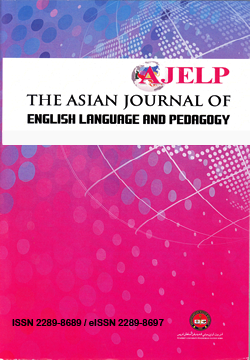Examining the Mechanisms Utilized by CML Web-Logging Instructors in ESL Classroom: A Case Study
DOI:
https://doi.org/10.37134/ajelp.vol7.2.4.2019Keywords:
Web-logging, ESL, WritingAbstract
The current study seeks to explore six Malaysian ESL instructors use of CML Web-logging in teaching English as second language to Malaysian students at higher education institutions. A qualitative approach was adopted to collect responses from the respondents. Data were collected using semi-structured interview, a set of questionnaires as well as a checklist of features of the web blog that is used to investigate the blogging activities and mechanisms used in the courses conducted by the respondents. The collected data from the interview were analyzed qualitatively, whereas the blog checklist data were analyzed quantitatively. The results indicated that in order to enhance their ESL instruction, the CML Web-Blogging instructors not only exhibited special ways of using the technology but they also designed various methods of exploiting the educational web blog capabilities in order to accommodate their pedagogical purposes and suit their specific course objectives.
Downloads
References
Creswell, John. W. (2009). Research Design: Qualitative, Quantitative, and Mixed Methods Approaches. 3rd edition. Thousand Oaks, California: SAGE Publications. Ind.
Deepak Singh Ratan Singh, Noriah Ismail & Intan safinas Mohd Ariff albakri. (2012). A Study on The Relationship Between Learners' Informal Exposure to English and Their Achievement in the Malaysia University English Test MUET. English Language Journal. 5(1): 94-112. Universiti Pendidikan Sultan Idris Publisher.
Gedera, D. S. P. 2011. Integration of weblogs in developing language skills of ESL learners. International Journal of Technology in Teaching and Learning, 7(2): 124-135.
Intan Safinas Mohd Ariff Albakri, Noriah Ismail. (2013). Undergraduates Students' Anxiety in Learning English. Malay Civilisation Journal. 8 (1) 2013. ISBN 1674-4271 Publisher: Universiti Pendidikan Sultan Idris, Malaysia.
Merriam, S. B. 1998. Qualitative research and case study applications in education. San Francisco, CA: Jossey-Bass.
Mohammadi, N., Ghorbani, V. and Hamidi, F. 2011. Effects of e-learning on Language Learning. Procedia Computer Science, 3: 464–468.
Noriah Ismail, Supyan Hussin & Saadiyah Darus. (2016). Investigating the Impacts of IQ-Write Online Writing Program toward ESL Students’ Attitude and Interest in Learning Academic Writing. (2016). The International Journal of The Interdisciplinary Educational Studies. 11, (1):21-34.
Noriah Ismail, Intan Safinas Mohd Ariff Albakri (2013). The Use of Students' Personal Self-Reflective Blog for Academic Writing Activities among ESL Tertiary Level Students. 5th International Conference on Education and New Learning Technologies EDULEARN13: Barcelona Spain: Pages 4617-4621
Rezaee, A. A. and Oladi, S. 2008. The effect of blogging on language learners' improvement in social interactions and writing proficiency. Iranian Journal of Language Studies, 2(1): 73-88.
Supyan Hussin, Rehab Omar Salem Aboswider, Noriah Ismail & Soo Kum Yoke (2016).Exploring Instructors Rationale and Perspectives in Using Blogs as a Tool for Teaching English as a Second Language. English Language Teaching Journal Canada: 9 (10) 142-155
Top, E., Yukselturk, E. and Inan, F.A. 2010. Reconsidering usage of blogging in preservice teacher education courses. Internet and Higher Education, 13: 214-217.
Warschauer, M. 2010. New tools for teaching writing. Language Learning & Technology, 14(1): 3–8.
Zawilinski, L. 2009. HOT Blogging: A Framework for Blogging to Promote Higher Order Thinking. The Reading Teacher, 62(8): 650–661.





